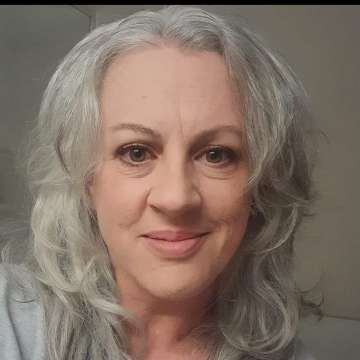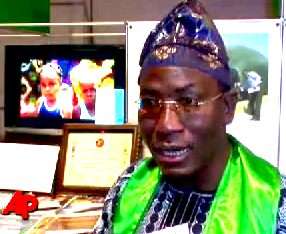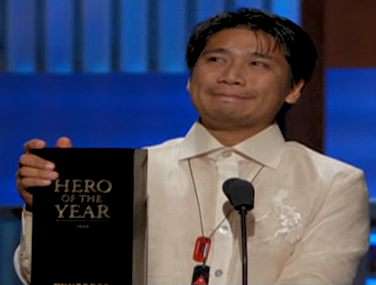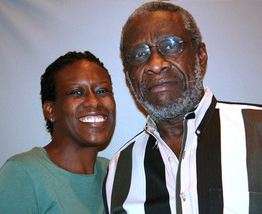The Tech Awards is an international program honoring innovators from around the world who are applying technology to benefit humanity. This year's winners received their awards at a Gala yesterday in San Jose, CA.
The 2009 Tech Awards Laureates represent regions as diverse as Nigeria, Brazil, Great Britain, the United States and Bangladesh. And their work impacts people in many more countries worldwide.
15 innovators were honored for projects that address global issues on the environment, economic development, education, equality and health. A $50,000 cash prize was awarded to one Laureate in each category.
One Nigerian company with its Cows to Kilowatts program lowers pollution from the slaughterhouse, eliminates greenhouse gas emissions, while producing clean, cheap energy. The technology turns animal blood and waste into inexpensive, clean energy for consumers.
An innovation called Ultra Rice addresses the severe vitamin deficiency especially in women and children around the world with its product, which looks, cooks and tastes just like rice.
Watch the video below, and at the bottom read a description of the Laureates and their life-changing work.
The Tech Awards Laureates 2009:
Dr. Joseph Adelegan, Cows to Kilowatts (Nigeria): Slaughterhouse waste is one of the most significant sources of water pollution and greenhouse gas emissions in most developing economies. The anaerobic fixed film reactor used in the Cows to Kilowatts project (link opens in PDF) decontaminates the waste stream from slaughterhouses and turns this organic waste into methane that can be used to generate electricity or as inexpensive cooking gas.
GRUPEDSAC Eco-techniques Toolkits for Self-Sufficiency (Mexico): Poor quality of life in rural Mexico includes loss of soil fertility, lack of access to clean water, adequate shelter, nutrition, and health resources. Customizable Eco-techniques Toolkits for Self-Sufficiency combine old and new sustainable technologies — from cisterns to solar ovens — to fit the needs of each community.
Sean White, Electronic Field Guide (USA): Plant species are disappearing at an alarming rate; mobile identification and classification of plant species may aid in conservation and cataloguing. The Electronic Field Guide uses mobile-augmented photo identification of leaves based on virtual reality and situated visualization.
Alternative Energy Development Corp., Alternative Energy for Empowerment (South Africa): Fuel cell use largely avoids the lead-acid waste of solar or wind installation batteries. Inexpensive, zinc-air fuel cells can be used in poor communities lacking access to grid power. Fuel cell waste can even be recycled as fertilizer.
Solar Ear (Botswana and Brazil): Standard Western hearing aids cost an average of $750, with battery costs typically $1 per week. Solar Ear, an inexpensive hearing aid suited to local conditions and manufactured by deaf workers who train one-another, costs $100 and is paired with a solar recharging unit for the batteries.
Driptech (India): Hundreds of millions of people in the developing world face water shortages in crop production; drip irrigation delivers precisely the right amount of water and not more. Driptech's unique laser technology drills holes in one main line, thereby reducing the number of parts and the cost of a drip irrigation system.
Akshaya Patra Foundation, School Meals Program (India): High quality, nutrient rich meals are key to the education process in poverty stricken areas. The School Meals Program uses integrated and adapted high-performance kitchen technology and food delivery systems to serve millions of Indian children a nutritious daily meal.
GeoGebra: Dynamic Mathematics for Everyone is a free, open-source software to display and practice geometry and mathematics that will help achieve rapid diffusion of information and quicker comprehension. GeoGebra created web-based, open-source software to visualize and practice geometric-based mathematics.
The Khan Academy: High school students around the world need informal, clear explanations that can be reviewed at a leisurely pace to supplement their formal learning. The Khan Academy created hundreds of free educational videos in math, statistics, physics, and finance using drawing software. The "blackboard" style videos are accessible via the internet and hosted on YouTube.
World of Good Development Organization (International): Handicraft workers around the world are generally paid per piece, often at low hourly rates. World of Good‘s Fair Wage Guide Software provides localized pricing evaluation of handmade goods to improve wages of informal workers. The free web-based platform encourages ethical trade by comparing wages worldwide.
Kiwanja.net: kiwanja.net's FrontlineSMS allows for SMS technology to be used by hundreds of NGOs worldwide, for activities as diverse as election monitoring and dissemination of agricultural prices. This free software for non-governmental organizations deploys two-way SMS messaging and provides easy-to-use communications infrastructure for outreach in rural and urban areas.
Shidhulai Swanirvar Sangstha (Bangladesh): Providing mobile solar lighting can alleviate health problems due to smoke and CO2 emissions while establishing social enterprises. Retrofitting existing kerosene hurricane lanterns with CFL or LED lights can provide lighting for transient settlers in flood and hurricane-prone areas. SuryaHurricane also establishes women-oriented infrastructure for recharging lantern batteries using boats equipped with PV modules.
mPedigree (Ghana): Counterfeit drugs are ubiquitous in the developing world; up to 80 percent of drugs in pharmacies are fakes with little or no active ingredients. Pharmaceutical manufacturers label packages with an alphanumeric code, which is later confirmed when consumers send free text queries in to the mPedigree database. This low-cost, instant method for reducing drug counterfeiting is expanding from Ghana to Nigeria, Rwanda, and India.
PATH, Ultra Rice: More than a billion people in developing nations suffer from dietary deficiencies in crucial micronutrients, including iron, zinc, folic acid, and vitamin A. Ultra Rice is an affordable, nutrient-fortified additive to standard rice, tailored to satisfy deficiencies common in the region where it is distributed.
Village Reach, Management Information System for Vaccine (Mozambique): Poor countries bear the greatest burden of infectious diseases, and have the least infrastructure for public health programs. Village Reach worked closely with the Mozambique Ministry of Health to implement supply chain logistics management systems, utilizing portable USB drives to automatically update and share information to improve the delivery of vaccines, drugs and critical medical supplies to rural clinics.
For more information about The Tech Awards, visit: www.techawards.org/










Be the first to comment